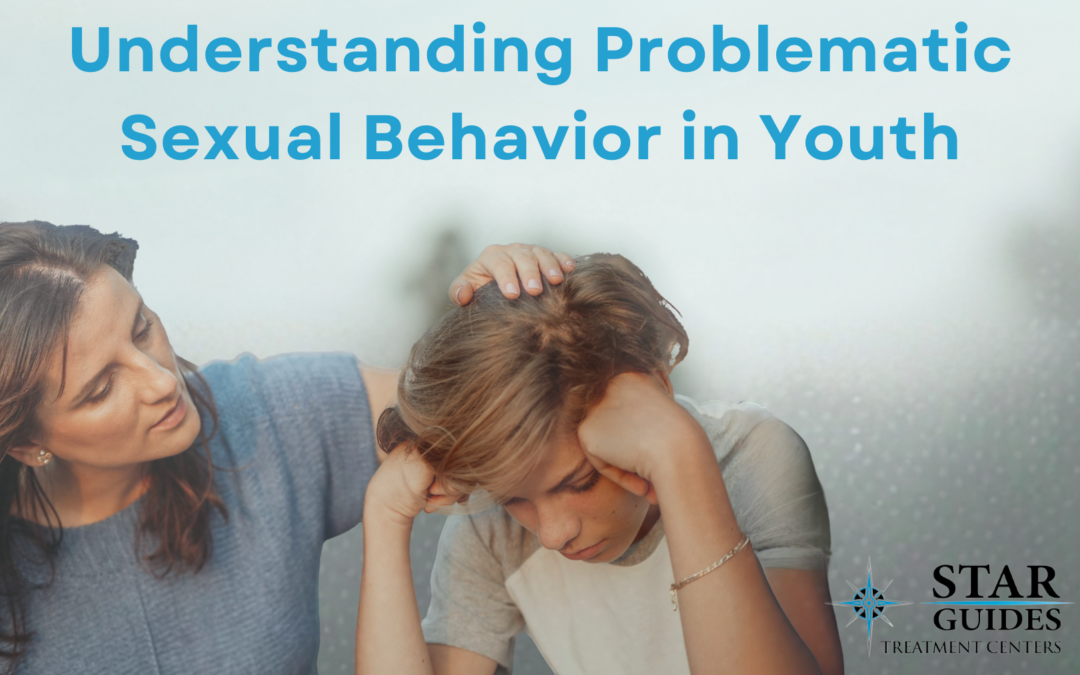Problematic sexual behavior in youth refers to behaviors that are developmentally inappropriate or potentially harmful to the child or others. These behaviors can range from excessive curiosity about sexuality to more serious actions that may involve coercion or force. Addressing problematic sexual behavior in youth is essential as it can have lasting impacts on their social, emotional, and psychological development.
Identifying Problematic Sexual Behavior
Recognizing PSB in youth requires a nuanced understanding of what constitutes normal sexual development and what crosses the line into problematic territory. Here are some key indicators:
- Age-Inappropriate Behavior: Sexual behaviors that are not typical for the child’s age group. For instance, a young child exhibits knowledge of sexual acts that are beyond their developmental level.
- Aggressive or Coercive Actions: Behaviors that involve forcing or attempting to force others into sexual activities, whether through physical force, manipulation, or threats.
- Impact on Relationships: Sexual behaviors that interfere with the child’s ability to form healthy, age-appropriate relationships. This can include isolating themselves or others or using sexual behavior as a means of exerting control.
- Repetitive Nature: Behaviors that are persistent and repetitive despite interventions or guidance from adults.
Causes of Problematic Sexual Behavior
Understanding the causes of PSB in youth is critical for effective intervention. Some common factors that may contribute to the development of these behaviors include:
- Exposure to Sexual Content: Early or inappropriate exposure to sexual material, whether through media, the internet, or real-life situations, can lead to PSB.
- Trauma or Abuse: Children who have experienced sexual abuse, physical abuse, or neglect may develop PSB as a way to process or cope with their experiences.
- Family Dynamics: Dysfunctional family environments, including those with poor supervision, lack of boundaries, or exposure to domestic violence, can increase the risk of PSB.
- Mental Health Issues: Children with underlying mental health conditions, such as impulse control disorders, may exhibit PSB as a symptom of their broader struggles.
The Role of Treatment in Addressing Problematic Sexual Behavior
Effective treatment for PSB in youth involves a combination of therapeutic approaches, family involvement, and, when necessary, community support. Early intervention is key to preventing the escalation of these behaviors and helping the child develop healthy relationships.
Evidence-Based Interventions
Several evidence-based interventions are effective in treating PSB in youth:
- Cognitive-Behavioral Therapy (CBT): CBT helps children understand and modify their behavior by addressing the thoughts and emotions that drive their actions. It also teaches them coping strategies to manage impulses and develop healthier ways of interacting with others.
- Trauma-Focused Therapy: For children who have experienced trauma, trauma-focused therapy can be crucial. This approach helps them process their experiences in a safe and supportive environment, reducing the likelihood that they will express their pain through PSB.
- Family Therapy: Engaging the entire family in the treatment process is often essential. Family therapy can help address underlying dynamics that may contribute to the child’s behavior, such as communication patterns, discipline strategies, and boundary-setting.
- Psychoeducation: Educating the child and their family about normal sexual development, boundaries, and consent is a vital component of treatment. This knowledge empowers families to guide their children toward healthier behaviors.
The Importance of a Supportive Environment
Creating a supportive environment is crucial for children undergoing treatment for PSB. This includes:
- Clear Boundaries: Establishing and maintaining clear, consistent boundaries within the home and other settings helps the child understand acceptable behavior.
- Supervision: Close supervision is often necessary to ensure that the child is not engaging in inappropriate behaviors. This also provides opportunities to reinforce positive behaviors.
- Positive Reinforcement: Encouraging and rewarding appropriate behavior can help the child learn to replace PSB with healthier interactions.
Community and School Involvement
Communities and schools play a critical role in supporting children with PSB. This includes:
- Education Programs: Schools can offer programs that educate children about healthy relationships, boundaries, and consent, which can prevent the development of PSB.
- Collaborative Approach: Schools, therapists, and families should work together to create a consistent approach to addressing PSB. This might involve developing individualized education plans (IEPs) or behavior intervention plans (BIPs) that include specific strategies for managing the child’s behavior in the school setting.
- Safe Spaces: Creating safe, non-judgmental environments where children can discuss their feelings and behaviors without fear of punishment can encourage them to seek help when needed.
Legal and Ethical Considerations
Addressing PSB in youth also involves navigating complex legal and ethical issues. These include:
- Mandatory Reporting: Professionals working with children are often mandated reporters, meaning they are legally required to report suspected abuse or neglect. This can include reporting PSB if it is linked to underlying abuse.
- Confidentiality: Balancing the need for confidentiality with the requirement to protect the child and others can be challenging. Professionals must navigate these issues carefully, ensuring that they are acting in the best interests of the child while adhering to legal requirements.
- Consent and Autonomy: As children age, their autonomy and ability to consent become important considerations in treatment. Therapists and other professionals must respect the child’s developing sense of self while guiding them toward healthier behaviors.
Conclusion
Problematic sexual behavior in youth is a complex issue that requires a comprehensive, multi-faceted approach. By understanding the causes, identifying the behaviors, and implementing evidence-based interventions, we can help children overcome these challenges and develop into healthy, well-adjusted adults. At Star Guides, we are committed to providing the support and treatment necessary to address PSB in youth, helping them build a foundation for a brighter future. If you are concerned about a child’s behavior, reach out to us to learn more about how we can help.

